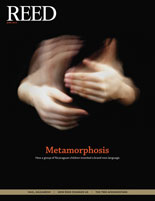
IRIS login | Reed College home Volume 92, No. 2: June 2013
Eliot Circular
Striking Keys in Africa

Cole Perkinson ’13 plays a Zimbabwean marimba in the Quad. His other instruments include a deze (hollowed-out gourd), a mbira (thumb piano propped up inside the deze), hosho (shakers), and a chipendani (one-stringed mouth bow). Photo by Matt D'Annunzio
By Lauren Cooper ’16
All roads lead somewhere. For Cole Perkinson ’13, they lead to Africa.
Cole, a chemistry–physics major, has been awarded a Watson Fellowship to spend a year in Africa exploring native music.
The Watson Year provides fellows with an opportunity to test their aspirations, abilities, and perseverance through a personal project that is cultivated on an international scale. Watson Fellows have gone on to become CEOs of major corporations, college presidents, diplomats, artists, lawyers, doctors, journalists, and renowned researchers and innovators. The program offers a stipend of $25,000 to 40 fellows from 40 liberal arts colleges to pursue an independent study of something they are passionate about in a country that is not their own.
For Cole, that passion is Zimbabwean music, which he has played with his family since he was 10 years old. “It’s some of the most fun music around to play,” he says. “There’s room to explore in the music and invent everywhere.”
In addition to its complex rhythmic patterns and vast range of moods—from exuberant dancing to spiritual ceremony—Zimbabwean music is a profoundly social activity, Cole says.
Son of Professor David Perkinson [mathematics 1990–] and Diane Perkinson, Cole is also passionate about chemistry and physics and has been active in Reed’s Science Outreach program. Cole believes the two fields have much in common.
“I think there’s an inherent connection between music and mathematics,” he says. “You often see people who are interested in both; they seem to go together. They’re both pursuits that are abstract and because of that, they’re beautiful in their own sense. They’re not trying to achieve some sort of secondary goal.”
Cole will spend time in five African nations: Zimbabwe, Botswana, Mozambique, South Africa, and Ghana. In each country he will work with traditional musicians and then travel with groups that play more modern music.
After he completes his musical tour of Africa, he plans to reapply to Cambridge for graduate school. (He was accepted this year, but chose to pursue the Watson instead.) At Cambridge, he hopes to pursue a master’s or PhD in the physics department at Cavendish Laboratory and to get involved with chamber and choral music.
For the next year, however, he sees himself playing a lot of marimba music. He leaves for Africa on August 1.

LATEST COMMENTS
steve-jobs-1976 I knew Steve Jobs when he was on the second floor of Quincy. (Fall...
Utnapishtim - 2 weeks ago
Prof. Mason Drukman [political science 1964–70] This is gold, pure gold. God bless, Prof. Drukman.
puredog - 1 month ago
virginia-davis-1965 Such a good friend & compatriot in the day of Satyricon...
czarchasm - 4 months ago
John Peara Baba 1990 John died of a broken heart from losing his mom and then his...
kodachrome - 7 months ago
Carol Sawyer 1962 Who wrote this obit? I'm writing something about Carol Sawyer...
MsLaurie Pepper - 8 months ago
William W. Wissman MAT 1969 ...and THREE sisters. Sabra, the oldest, Mary, the middle, and...
riclf - 10 months ago